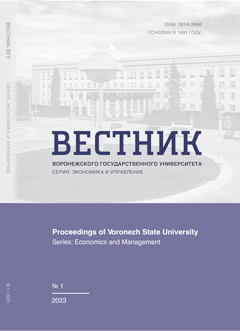Развитие корпоративной социальной ответственности промышленных предприятий Воронежской области - институциональный и организационный аспекты
Аннотация
Предмет. Текущее десятилетие мировым сообществом признано «десятилетием решительных действий», направленных на активную борьбу с многочисленными социальными и экологическими проблемами. Решение поставленной задачи невозможно без мобилизации усилий бизнеса. В этой связи актуальность приобретает корпоративная социальная ответственность (КСО), а также вопрос интеграции ее принципов в деятельность бизнес-структур. Поскольку промышленный сектор характеризуется наиболее существенным влиянием на окружающую среду и местное сообщество, привлечением значительного числа трудовых ресурсов, особый интерес представляет реализация КСО промышленными предприятиями.
Цель. Анализ и оценка перспектив развития корпоративной социальной ответственности промышленных предприятий Воронежской области.
Методология. Для проведения исследования использовалась количественная стратегия сбора и анализа информации. Эмпирическую базу составили данные анкетного опроса 30 промышленных предприятий Воронежской области.
Результаты. Эмпирическое исследование позволило сформировать общую картину понимания и реализации КСО промышленными предприятиями Воронежской области, в части: состава основных программ и адресатов КСО; используемых в деятельности международных и национальных стандартов КСО и формирования внутренних институтов развития КСО; характера и форм взаимодействия предприятий с государством и некоммерческими организациями, оценки перспектив и барьеров развития КСО.
Выводы. Социальная ответственность непубличных региональных промышленных предприятий остается фрагментарной. Наблюдается разрыв между актуальным содержанием КСО, его пониманием управленческими кадрами предприятий и текущей реализацией социальных программ в практической деятельности. Все действия промышленных предприятий в области КСО являются продолжением их технико-технологических процессов или бизнес-процессов. Внепроизводственной деятельности предприятия уделяют мало внимания. Предприятия не заинтересованы в раскрытии информации о своей деятельности, снижении неблагоприятного воздействия на окружающую среду, участии в жизнеобеспечении территорий присутствия и формировании гражданского общества. Предприятия действуют как закрытые системы, существующие вне общества. В целях развития КСО региональных промышленных предприятий предложен комплекс мер (финансово-экономических, организационных, информационно-просветительских), актуализирующий содержание региональной промышленной политики.
Литература
Blagov, Y. E., Kabalina, V. I., Petrova-Savchenko, A. A. & Sobolev, I. S. (2015) [Creating Value for Business and Society: Analysis of the Corporate Social Performance of Social Companies]. Russian Management Journal. 13, 67‒98. (In Russian).
Borzakov, D. V. & Nikitina, L. M. (2019) [Managerial Control of Corporate Social Responsibility: Normative, Informational and Methodological Support]. Voronezh, VSU Publ. (In Russian).
Dolgopyatova, T. G. (2008) Firm-level Empirical Surveys: Total and Practice. The HSE Economic Journal. 2, 239‒271. (In Russian).
Nikitina, L. M. & Borzakov, D. V. (2015) [Corporate Social Responsibility]. Rostov-na-Donu, Feniks Publ. (In Russian).
Nikitina, L. M. (2009) [Corporate Social Responsibility of Voronezh Enterprises in the Context of Global and Russian Trends of Development]. National Interests: Priorities and Security. 23, 50‒60. (In Russian).
Nikitina, L. M. & Rasner, E. I. (2008) [Assessment of Corporate Social Responsibility by the Management of Voronezh Enterprises]. Central Russian Journal of Social Sciences. 4, 115‒122. (In Russian).
Serdobolskaya, I. O. & Mukhamedshina, A. N. (2014) [The Basic Tendencies and Prospects of Development of Corporate Social Responsibility at Large Poultry Enterprises of Russia]. Upravlenets. 6, 10‒17. (In Russian).
Sovetova, N. P., Laptsova, E. S. & Sudakova, N. Y. (2016) The Research Issues of Social Responsibility of Business in the Territory of the Municipality «City of Vologda». Vestnik of Volga State University of Technology. Series: Economics and Management. 2, 5‒25, doi: 10.15350/2306-2800.2016.2.5. (In Russian).
Cheglakova, L. M., Bataeva, B. S. & Melitonyan, O. A. (2018) [Key Features of Social Responsibility and Business Ethics for Small and Medium Enterprises in Russia]. Russian Management Journal. 16, 63‒94, doi: 10.21638/10.21638/11701/spbu18.2018.103. (In Russian).
Aastha, B. & Shazi, S. J. (2019) Corporate Social Responsibility Practices in Small and Medium Enterprises. Polish Journal of Management Studies. 19 (1), 9‒20, doi: 10.17512/pjms.2019.19.1.01.
Bashar, M. A. (2020) Exploring New Ways of Communicating CSR to the Levant Stakeholders: An Empirical Study. Business and Management Research. 9 (2), 25‒48, doi: 10.5430/bmr.v9n2p25.
Fordham, A. E. & Robinson, G. M. (2018) Mapping Meanings of Corporate Social Responsibility – an Australian Case Study. International Journal of Corporate Social Responsibility. 3 (14), 1‒20, doi: 10.1186/s40991-018-0036-1.
Margolis, J. D., Elfenbein, H. A. & Walsh, J. P. (2007) Does it pay to be good? A meta–analysis and redirection of research on the relationship between corporate social and financial performance. Harvard Business School. doi: 10.2139/ssrn.1866371.
Margolis, J. D. & Walsh, J. P. (2003) Misery Loves Companies: Rethinking Social Initiatives by Business. Administrative science quarterly. 48 (2), 268‒305, doi: 10.2307/3556659.
Peloza, J. (2009) The Challenge of Measuring Financial Impacts from Investments in Corporate Social Performance. Journal of Management. 35 (6), 1518‒1541, doi: 10.1177/0149206309335188.
Copyright (c) 2021 Никитина Л.М., Перцева Ю.А.

Это произведение доступно по лицензии Creative Commons «Attribution» («Атрибуция») 4.0 Всемирная.























